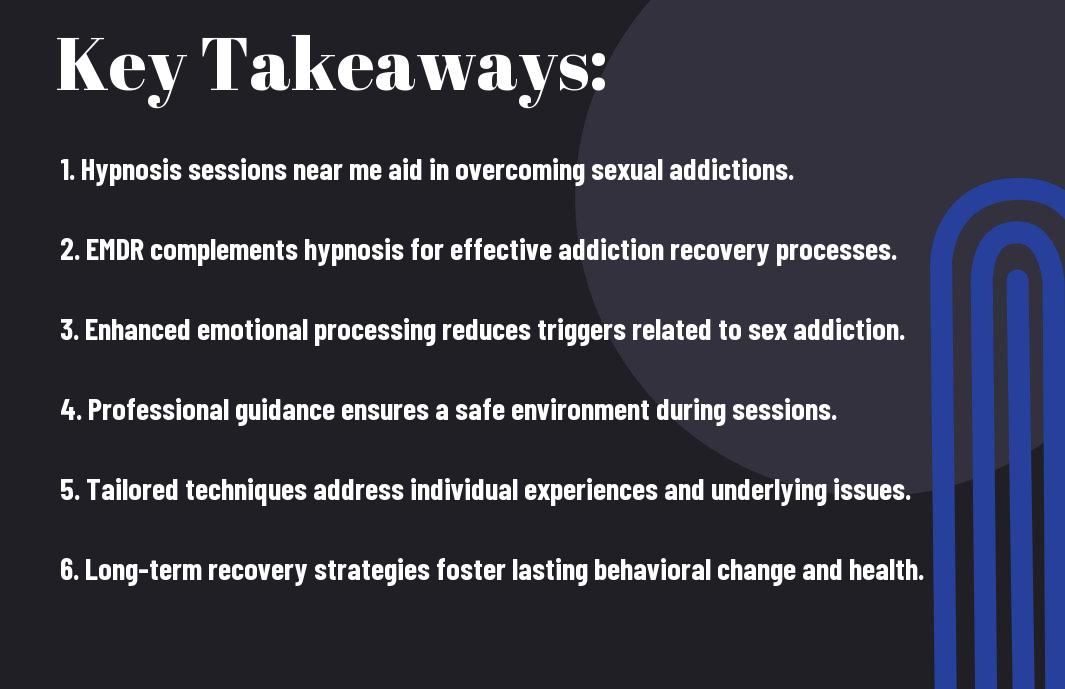Hypnosis Sessions and EMDR for the Treatment of Sexual Addictions
Many individuals struggling with sex addictions seek effective solutions to regain control of their lives. This blog post will explore the powerful combination of hypnosis sessions and Eye Movement Desensitization and Reprocessing (EMDR), two advanced therapeutic techniques that can help you address the underlying issues contributing to your addiction.
By understanding how these methods work and finding hypnosis sessions near you, you can take significant steps toward healing and reclaiming your well-being. Let’s dive deeper into how these treatments can transform your life.
Key Takeaways:
- Hypnosis Sessions Near Me can be a powerful tool in addressing sex addictions, providing tailored therapeutic techniques to facilitate emotional healing and behavioural change.
- Through Advanced Hypnosis, individuals can access their subconscious mind to identify and alter deep-seated beliefs that contribute to compulsive sexual behaviours.
- EMDR (Eye Movement Desensitization and Reprocessing) complements hypnosis by helping clients process traumatic experiences that may trigger addictive patterns, accelerating recovery outcomes.
- The combination of Hypnosis and EMDR creates a holistic approach, addressing both the mind’s patterns and emotional wounds that foster addiction.
- Finding local hypnosis sessions with certified professionals can enhance access to customized treatment plans crucial for managing and overcoming sex addictions effectively.

Understanding Sex Addictions
Definition of Sex Addiction
Sex addiction, often termed sex addiction or hypersexuality, is characterized by an overwhelming urge or compulsive sexual behaviour that significantly disrupts your daily life. Unlike normal sexual excitement, sex addiction drives you to engage in sexual activities despite their negative consequences.
This can manifest in various forms, including excessive pornography consumption, compulsive masturbation, or engaging in risky sexual behaviours with multiple partners. Importantly, the imbalance it creates can lead to a loss of control over your sexual impulses.
Understanding sex addiction involves recognizing that it is not merely a lack of willpower or moral failing; it is a genuine mental health condition that can profoundly affect your emotional and psychological well-being. Individuals grappling with sex addiction often find themselves entrapped in a vicious cycle of temporary relief followed by feelings of shame and guilt, which can exacerbate the problem.
The behavioural patterns are similar to those observed in substance use disorders, highlighting the need for effective interventions such as hypnosis sessions near me and EMDR therapy to facilitate recovery.
Ultimately, it’s crucial to understand that sex addiction is not just about sexual acts. It encompasses a range of behaviours that can serve as coping mechanisms for deeper emotional issues, such as anxiety, depression, or trauma.
Acknowledging this definition is the first step toward seeking treatment and reclaiming control over your life. Recognizing the problem is vital, as the road to recovery requires not only understanding your addiction but also addressing the emotional turmoil it produces.
Causes and Contributing Factors
The causes of sex addiction can be multifaceted and complex. Various biological, psychological, and environmental factors contribute to its development.
For example, individuals with a history of sexual trauma or abuse may find themselves turning to compulsive sexual behaviours as a means of coping with unresolved emotional pain. This coping mechanism often spirals into addiction, creating a feedback loop that perpetuates the cycle of self-destructive behaviour.
Additionally, neurobiological studies suggest that sex addiction may involve imbalances in your brain’s reward system. The chemical responses associated with sexual arousal can trigger the release of dopamine, reinforcing the behaviour and creating cravings similar to those experienced by people addicted to drugs or alcohol.
Furthermore, social factors such as societal expectations, exposure to sexual content at a young age, or peer influences can create an environment conducive to developing unhealthy sexual habits.
Understanding these underlying causes is crucial for effective treatment. Therapies like hypnosis sessions near me can help uncover these deeper issues, allowing you to address the root causes of your addiction rather than merely treating the symptoms. Knowing that recovery entails managing these contributing factors sets the stage for long-term healing.
- Biological Factors
- Psychological Factors
- Environmental Influences
Knowing these elements helps develop a comprehensive treatment plan tailored to your needs.
Signs and Symptoms
For many individuals, the signs of sex addiction can be subtle at first but progressively intensify over time. Common symptoms include a preoccupation with sexual thoughts and activities, feelings of guilt and shame, and withdrawal from social or personal relationships.
You might notice compulsive behaviours where you engage in sexual activities even when you prefer to be doing something else or when it conflicts with your responsibilities. This compulsive cycle can also lead to destructive patterns, affecting your personal and professional life.
Moreover, you may find yourself seeking out sexual experiences or engaging in risky behaviour that poses a threat to your health or well-being. These behaviours can include anonymous sexual encounters or even engaging with underage individuals, both potentially resulting in severe consequences.
You may oscillate between intense periods of sexual activity followed by crashes of emotional distress or regret, further complicating your relationship with your sexual identity. Recognizing these signs early can facilitate timely intervention, making available resources such as hypnosis sessions near me even more critical for recovery.
Additionally, the inability to manage sexual impulses can lead to significant distress in relationships. Whether it’s through infidelity, neglecting personal obligations, or hurting those around you, compulsive sexual behaviour often creates a ripple effect of pain that extends beyond just yourself.

Awareness of these symptoms is vital, as they indicate that professional help and therapy are necessary for change. Following this path will lead you toward insight, self-discovery, and healing.
- Preoccupation with Sexual Thoughts
- Compulsive Sexual Behaviors
- Signs of Emotional Distress
The symptoms can lead to profound consequences that necessitate insightful intervention.
Psychological Impact
With sex addiction, the psychological impact can be incredibly profound. You often experience feelings of shame, guilt, and self-loathing that can lead to a deterioration of your mental health. Such emotions can foster negative self-esteem and further entrench you in your compulsive behaviours.
The crisis of identity can lead you to withdraw from meaningful relationships, work, and other activities that were once rewarding. This withdrawal can create an isolating experience where you feel trapped in your thoughts, leading to potential mental health issues such as anxiety and depression.
The compulsive engagement with sexual activities as a form of escape is often a sign of underlying psychological trauma that has not been adequately addressed. Problems like childhood abuse, neglect, or exposure to sexualized environments can lead to complex emotional wounds.
Engaging in unhealthy sexual behaviours often becomes a maladaptive coping mechanism, allowing you to avoid confronting these painful feelings. Importantly, such coping strategies can hinder personal growth and recreation of healthy relationships, leading to a sense of ongoing crisis.
Furthermore, the societal stigma surrounding sexual issues can exacerbate feelings of shame and isolation. You may hesitate to seek help due to fear of judgment, which only perpetuates the cycle of addiction.
Therefore, addressing these psychological impacts is crucial to recovery. Effective treatments such as hypnosis sessions near me or EMDR can facilitate self-exploration and healing, allowing you to confront these underlying issues and rebuild your self-esteem. This journey of psychological healing is critical for breaking free from the chains of sex addiction.

This psychological impact underlines the necessity for tailored therapeutic interventions. It’s not just about stopping addictive behaviours; it’s about understanding the emotional landscape that fuels them. Thus, knowing the ramifications of sex addiction on your psychological well-being will empower you to seek the help you need to forge a path toward recovery.
The Role of Hypnosis in Treatment
Once again, when addressing the complexities of sex addictions, it’s crucial to probe into the role of hypnosis within the treatment landscape. Hypnosis, often misunderstood in mainstream culture, is a powerful psychological tool that can significantly enhance the recovery process for individuals grappling with their compulsive behaviours.
The essence of hypnosis lies in its ability to foster a state of deep relaxation and heightened focus, allowing you to access your subconscious mind. This access can lead to breakthroughs in understanding deeply rooted issues that often contribute to addictive behaviours.
Overview of Hypnosis
Hypnosis focuses on creating an optimal mental state where you can achieve greater awareness and receptivity. In such a state, your conscious mind takes a step back, enabling the unconscious mind to engage more readily with suggestions and therapeutic insights. You may envision hypnosis as a guided journey that leads you to explore your thoughts and feelings without the usual barriers or distractions. This journey allows you to confront uncomfortable emotions or memories that may be linked to your addiction.
It’s important to emphasize that hypnosis is a collaborative process between you and the practitioner. You remain in control throughout the entire session and can choose to engage with the material being presented.
Furthermore, many individuals have reported positive experiences during hypnosis sessions, highlighting its effectiveness in reducing anxiety, promoting relaxation, and enhancing self-awareness. In the context of sex addictions, this increased self-awareness can be critical in understanding triggers and developing healthier coping mechanisms.
In the therapeutic setting, you may utilize hypnosis sessions to uncover the core beliefs and emotional experiences that fuel your compulsive behaviours. These sessions can be tailored specifically to your needs, ensuring a personalized treatment approach.
As a result, hypnosis can serve as a valuable adjunctive tool in a comprehensive addiction treatment plan, especially when paired with interventions like Eye Movement Desensitization and Reprocessing (EMDR) therapy.
Mechanisms of Hypnosis
To comprehend how hypnosis facilitates recovery from sex addictions, it’s necessary to explore its mechanisms. Hypnosis can alter brain activity, effectively allowing you to experience a state of heightened suggestibility and focused concentration. During hypnosis, certain brain regions associated with critical thinking and self-reflection may become subdued, while other areas, related to emotional processing and imagination, become more active.
This shift in brain function allows you to access memories and beliefs that influence your behaviours—making it easier to confront and reframe those that contribute to your addiction.
Moreover, the therapeutic relationship that forms between you and your hypnotist can amplify the effectiveness of treatment. Trust is a fundamental component that fosters a safe environment, allowing you to engage openly with your vulnerabilities.

Through guided imagery and positive suggestion, hypnosis facilitates cognitive restructuring, enabling you to challenge and change harmful thought patterns that perpetuate sexual compulsions. This transformative process is crucial in addressing the root causes of your addiction.
This enhanced understanding of your subconscious mind equips you with tools to confront personal challenges and cultivate resilience in your recovery journey. By utilizing the insights gained from hypnosis, you can develop strategies to manage triggers and cravings more effectively, thus paving the way for a healthier relationship with yourself and others.
Hypnosis Techniques Used in Treatment
One of the most effective techniques used in hypnosis for treating sex addictions involves progressive relaxation. This technique guides you through a sequence of relaxation exercises, gradually easing tension throughout your body and helping your mind transition into a receptive state.
This deep relaxation serves as a foundation for exploring thoughts and feelings associated with your addiction without the interference of stress or anxiety.
Another technique often utilized is guided visualization, in which your hypnotist leads you through imaginative scenarios that allow you to confront and process your addiction. This method enables you to visualize alternative responses to triggers and develop coping strategies that align with your recovery goals.
Such immersive imagery can empower you to reinforce positive behaviours and internalize a new narrative surrounding your sexuality.
Additionally, some practitioners might employ post-hypnotic suggestions, where you’ll learn to associate certain cues with healthier behaviours. This entails planting positive reminders into your subconscious that can resurface in triggering moments, thereby assisting you in making healthier choices. The integration of various hypnosis techniques offers a robust framework for addressing sexual compulsions through actionable insights and practical skills.
Benefits of Hypnosis for Sex Addictions
Treatment through hypnosis uniquely benefits individuals battling sex addictions by addressing the underlying emotional and psychological factors that contribute to compulsive behaviours. One significant advantage is that hypnosis can help reduce anxiety and stress, creating a safe space for emotional exploration.
During this process, you become more attuned to the emotional triggers and beliefs that may lead to relapsing behaviours, allowing for a profound self-discovery experience.
Moreover, hypnosis fosters a heightened state of self-awareness, enabling you to recognize unhealthy thought patterns and replace them with healthier ones. This increased awareness can have a dramatic effect on your decision-making process, supporting you in developing coping skills that promote lasting recovery.
As a result, hypnosis can transform how you navigate your relationships and day-to-day challenges, enabling you to lead a more balanced and fulfilling life.

Mechanisms involved in hypnosis, such as cognitive restructuring and emotional processing, empower you to reframe your experiences. By addressing the core beliefs that fuel your addictions, you can cultivate a deeper understanding of your behaviours and unmet needs.
This understanding leads to increased compassion for yourself—vital in fostering long-lasting change and recovery. Ultimately, through tailored hypnosis sessions, you take significant strides toward reclaiming your life from the grips of sex addiction.
Eye Movement Desensitization and Reprocessing (EMDR)
Introduction to EMDR
For many individuals struggling with sex addiction, the journey to recovery can feel overwhelming and isolating. One powerful therapeutic approach that has gained traction in recent years is Eye Movement Desensitization and Reprocessing (EMDR).
This innovative treatment technique helps individuals process traumatic memories that may be contributing to their addictive behaviours. By utilizing EMDR, you can work through underlying issues and create healthier coping mechanisms for your sexual urges. Understanding the principles of EMDR and how it functions can empower you in your recovery journey.
EMDR was originally developed to treat post-traumatic stress disorder (PTSD), but its applications have expanded to various mental health issues, including sex addictions. The technique involves a structured process of recalling distressing experiences while engaging in a form of bilateral stimulation, often through guided eye movements.
By doing so, EMDR helps you reprocess these memories in a way that diminishes their emotional charge, allowing you to approach situations related to your addiction with greater clarity and resilience.
As you research deeper into EMDR, it is crucial to recognize that this approach is not a quick fix but rather a comprehensive therapeutic framework. Your therapist will guide you through the different phases of EMDR to ensure that you are adequately supported throughout the process.
By engaging with this method, you’re not only addressing the symptoms of your addiction but also uncovering and healing the underlying emotional wounds that may have contributed to your compulsive behaviours.
How EMDR Works
Reprocessing traumatic or distressing experiences is at the heart of EMDR’s effectiveness. During a typical EMDR session, your therapist will first help you identify a specific memory or trigger related to your sex addiction.
You will then be guided through a series of bilateral stimulation techniques, such as moving your eyes back and forth or listening to alternating sounds. This stimulation is believed to facilitate the brain’s natural processing ability, enabling you to integrate memories and thoughts more healthily.
The processing phase of EMDR allows you to confront the emotions tied to your addiction, rather than suppressing them. You might find that as you work through these memories, you gain insight into the root causes of your behaviours.
On top of alleviating the emotional burden tied to these memories, EMDR encourages positive cognitions about yourself and your ability to recover. This unique blend of reprocessing trauma and instilling positive beliefs can significantly alter your response to triggers in your daily life.
This structured approach has demonstrated significant results across various populations. Many individuals report feeling a sense of liberation and empowerment after just a few EMDR sessions. The therapeutic relationship with your practitioner is vital, as they help you navigate challenges and celebrate victories.
As you engage in the EMDR process, you may find that coping with sex addictions becomes more manageable and less daunting over time.
EMDR Techniques Relevant to Sex Addictions
EMDR techniques tailored specifically for sex addiction focus on addressing the emotional and psychological factors that fuel compulsive sexual behaviours. One powerful technique involves the “target memory,” where you select a specific event or trigger related to your addiction.

By concentrating on this memory while receiving bilateral stimulation, you facilitate emotional processing and move towards a healthier understanding of your behaviours.
Additionally, you may encounter “resource development,” where you create mental safe spaces or draw from positive memories. This technique reinforces beneficial coping strategies, allowing you to navigate urges with more resilience.
By incorporating these tailored techniques, you can rewire your responses to sexual stimuli, transforming them into moments of power rather than vulnerability. As your resilience builds, you will likely find healthier ways to fulfill your emotional needs.
A profound aspect of EMDR techniques for sex addiction also involves aftercare strategies to maintain your progress. These strategies can include ongoing self-reflection, journaling, or practicing mindfulness.
Each of these approaches helps keep you grounded and aware after each EMDR session. By integrating these techniques into your routine, you will be equipped to handle challenges that may arise during your recovery process.
Effectiveness of EMDR in Treating Addictions
Effectiveness is a key consideration for anyone contemplating treatment for sex addiction, and EMDR offers a robust method with a track record of success.
Numerous studies indicate that EMDR is effective in reducing symptoms associated with addiction, particularly when the addiction is rooted in trauma. This approach allows you to promptly address the emotional turmoil of unresolved experiences, which often feed into addictive behaviours.
As you engage with this treatment modality, research has shown that you may experience a reduction in cravings and an increased ability to cope with high-risk situations. While traditional therapies often focus solely on discussing problems, EMDR addresses the emotional roots at the core of your addiction.
This holistic approach can lead to more sustained recovery, instilling a sense of personal empowerment that can transform your life.
For instance, many individuals who undergo EMDR report lasting improvements, including reduced urges, increased emotional regulation, and stronger interpersonal relationships. This aligns with the overall objective of comprehensive addiction recovery: not only to relieve symptoms but also to foster resilience for a healthier future.
By exploring EMDR as part of your recovery journey, you may discover a pathway leading to deeper healing and lasting change.
Combining Hypnosis and EMDR
All forms of therapy aim to facilitate healing, but when it comes to complex issues like sex addiction, a deeper understanding of emotional processes is crucial. Combining hypnosis with Eye Movement Desensitization and Reprocessing (EMDR) presents a dual approach that addresses the conscious and unconscious layers of your experience.
Hypnosis sessions serve as a way to access deeper traumas and subconscious beliefs that may exacerbate your challenges with sex addiction. You might find it beneficial to utilize resources like SAMHSA’s National Helpline to gain a better understanding of how these therapies enhance self-awareness and emotional regulation. Together, these methodologies create a holistic healing environment that focuses on resolving underlying issues while equipping you with practical coping strategies.
The rationale for combining these two techniques lies in their ability to complement one another effectively. Hypnosis allows you to enter a state of focused awareness, making it easier to explore the root causes of your addiction.
This therapeutic state can lead to insights that inform your EMDR sessions, where bilateral stimulation techniques help you process troubling memories and emotions tied to your addiction. By integrating these methods, you are not merely addressing symptoms but are diving deeper into the emotional landscape that fuels addictive behaviours. This holistic strategy ensures that you build a robust foundation for recovery, allowing for long-lasting change.
Moreover, both hypnosis and EMDR rely on engaging with your subconscious mind. In your hypnosis sessions, you can uncover patterns of thought and behaviour that might go unnoticed in traditional therapy.
Read the reviews for Mind Spirit Body Hypnosis here:
When you bring these insights to your EMDR work, it creates a rich interplay of knowledge and healing. This integration allows for a more comprehensive understanding of how past experiences contribute to present-day challenges. By approaching your treatment from multiple angles, you can cultivate greater self-awareness, which is crucial for overcoming sex addiction.
Synergistic Effects on Treatment
EMDR and hypnosis work synergistically to produce effects that enhance your overall treatment experience. With hypnosis, you can effectively tap into your subconscious, which is invaluable when confronting the emotions and trauma associated with sex addiction.
EMDR’s structured approach to addressing these memories can allow for faster processing and resolution. Thus, the combination of these approaches provides both emotional exploration and cognitive restructuring. By addressing both the emotional and cognitive facets of your addiction, you create a comprehensive treatment that has the potential to foster profound change.
The therapeutic synergy between hypnosis and EMDR can lead to a more profound transformation in your understanding of your addiction. As you research into the subconscious through hypnosis, you may unearth memories and beliefs that have long been buried.
Once these elements are accessed, EMDR can be utilized to process them, significantly alleviating emotional distress and reducing the power they hold over you. These integrated sessions help create a safe space for self-discovery and healing, allowing your mind and spirit to reclaim a sense of autonomy from your addiction.
Treatment efficacy increases when you leverage the strengths of both hypnosis and EMDR. This synergy fosters an environment of trust, enabling you to engage more deeply in the therapeutic process.
With a well-structured treatment plan, you can unlock latent potential and recover more swiftly from the grip of addiction. Your commitment to integrating these therapies can serve as a high-impact catalyst in your journey toward recovery.
Case Examples of Combined Approaches
Synergistic approaches to treatment have numerous case examples demonstrating their effectiveness in addressing sex addiction. One case involved a client who had struggled with compulsive sexual behaviours rooted in childhood trauma.
By starting with hypnosis sessions, the client accessed repressed memories related to their trauma, which provided clarity on their addiction’s emotional triggers. The EMDR sessions that followed were instrumental in reprocessing those memories, enabling the client to experience a more empowering narrative about their past.

This combination not only alleviated the client’s compulsive behaviours but also contributed to a more fulfilling relationship with intimacy.
In another instance, a client found that engaging in hypnosis allowed them to identify specific beliefs about themselves that fueled their addiction. During subsequent EMDR sessions, the bilateral stimulation connected the client with these deep-seated beliefs, facilitating emotional release and cognitive restructuring.
As a result, the client reported a substantial decrease in urges and an improved self-image. These examples illustrate how the integration of hypnosis and EMDR creates a well-rounded treatment program, effectively addressing the multi-faceted nature of sex addiction.
Understanding the combined approach’s efficacy in various applications emphasizes the importance of tailored treatment plans in therapy. Each client presents unique challenges, and by closely observing their progress and responses to these dual techniques, professionals can enhance their approach. Leveraging the power of both hypnosis and EMDR offers a band of healing that can be transformative in managing and overcoming sex addiction.
Best Practices for Integration
The effects of integrating hypnosis and EMDR in therapy can deliver powerful outcomes when executed with expertise. As you initiate this journey, it’s vital to collaborate with qualified practitioners knowledgeable in both techniques.
Best practices for integration include maintaining clear communication between therapist and client to ensure mutual understanding. Structuring sessions so that hypnosis can effectively inform EMDR work will also maximize the therapeutic potential of this combined approach. Moreover, continuous evaluation of the treatment plan ensures that the therapeutic process remains aligned with your evolving needs, facilitating deeper healing.
Furthermore, remaining open and receptive during the sessions can enhance the synergy between hypnosis and EMDR. When you approach these sessions with a willingness to explore your thoughts and emotions, you increase the likelihood of uncovering impactful insights that can be processed more effectively. These two modalities are most effective when executed with mindful intention, drawing on techniques that resonate with you.
With a commitment to integrating both hypnosis and EMDR into your treatment plan, you can create a personalized approach that addresses your unique challenges as you seek recovery. Envisioning your journey toward healing through the dual benefits of these therapies will exponentially enhance your potential for change and recovery from sex addiction.
Practical Considerations for Therapy
Despite the complexities associated with treating sex addictions, several practical considerations can help you navigate the therapeutic process effectively. Understanding how to find qualified practitioners, set realistic goals, and monitor your progress ensures that you are well-prepared for the journey ahead. This process becomes manageable when you are equipped with the right strategies and information.
Finding Qualified Practitioners
An important first step in addressing sex addiction through hypnosis and EMDR is finding a qualified practitioner experienced in these specialized therapies. You want someone who not only has credentials but also a proven track record in treating sexual compulsions.
Start by researching reputable therapists in your area who are certified in hypnosis techniques and trained in EMDR. Online directories, professional associations, or referral services are great places to begin your search. Don’t hesitate to inquire about their experience with sex addiction specifically, as this credential could be pivotal in your healing journey.
It is vital to assess practitioners based on their therapeutic approaches and treatment philosophy. Some may focus solely on hypnosis, while others may integrate EMDR with mindfulness or cognitive-behavioural techniques.
During initial consultations, feel free to ask questions regarding their methods and previous success stories. Consider whether the therapist aligns with your values and comfort levels, as this rapport can significantly influence the effectiveness of your healing experience.
Ultimately, you deserve a supportive and understanding environment where you feel safe to explore the underlying issues of your addiction. Assess availability, accessibility, and whether they provide sessions in a format that works for you—whether in person or online.
By taking the time to find the right fit, your therapeutic journey can foster a productive and positive healing atmosphere.
Setting Realistic Goals for Treatment
Realistic goal-setting is fundamental in obtaining the most from your hypnosis and EMDR sessions. Consider your motivations for seeking therapy, and establish clear, achievable goals that will act as guiding points throughout your journey.
These goals will help you focus on specific areas of your life that need improvement, whether it’s reducing compulsive behaviours, enhancing self-esteem, or rebuilding relationships affected by your addiction.
Setting these goals requires introspection and honesty about the impact of your addiction and the desired outcomes you wish to achieve. Make sure your goals aren’t overly ambitious, as setting the bar too high can lead to disappointment and frustration. Instead, break down larger goals into smaller, manageable steps. This incremental approach allows you to celebrate small victories along the way, which can bolster your motivation and commitment to the therapeutic process.
The greater the clarity you have around your goals, the more focused your therapy will be. By collaborating with your practitioner to adjust goals as necessary, you can ensure that your treatment remains adaptable to your evolving needs. Consistent dialogue around your progress will help refine your focus and maintain momentum toward recovery.
Considerations for setting realistic goals should involve both short-term and long-term outcomes. This comprehensive approach encourages you to remain mindful of your progress while keeping the bigger picture of recovery in sight.
Duration and Frequency of Sessions
Practical considerations regarding the duration and frequency of your hypnosis and EMDR sessions are crucial for optimizing the effectiveness of your treatment. The time it takes to see significant improvements can vary widely based on factors such as the severity of your addiction, your personal goals, and how well you respond to therapy. Your practitioner will guide you in establishing a suitable schedule, which may require weekly or bi-weekly sessions, especially in the initial phases of treatment.
As you progress, the frequency of sessions can be adjusted according to your needs and achievements. For instance, some may find it beneficial to have more frequent sessions initially to establish a solid therapeutic foundation, while others might prefer to taper off as they gain confidence and coping skills. Your therapist will help you navigate this process, utilizing feedback from your sessions to assess how you are progressing towards your goals.
Additionally, it’s important to account for any accountability measures or homework assignments from your therapist. Often, the progress made in sessions can be cemented through practice outside of therapy. By dedicating time to work through exercises or reflecting on insights gained during therapy, you can reinforce the benefits and ensure a more comprehensive recovery.
To maximize the benefits of the therapy, consider the potential need for ongoing follow-up sessions. Regular check-ins may be helpful in the months following intensive treatment, providing a structured support network that encourages continued progress and accountability.
Monitoring Progress and Outcomes
For effective treatment of sex addiction via hypnosis and EMDR, it is imperative to monitor your progress regularly. An open line of communication with your therapist regarding what works and what doesn’t can help fine-tune your treatment plan.
Establishing ways to measure your progress, such as journaling your experiences or maintaining records of urges and behaviours, allows both you and your therapist to discern patterns and trends—offering rich insights for continued work.
Furthermore, tracking your outcomes will help validate the effectiveness of various therapeutic approaches utilized during your sessions. You might focus on different metrics such as emotional well-being, relationship improvements, or reductions in compulsive behaviours. Regular reviews with your therapist can shed light on how far you’ve come, fostering a sense of achievement and reinforcing the therapeutic alliance.
Bear in mind that recovery is rarely linear; there will be ups and downs along your journey. As such, consistency in monitoring will aid you—including during setback periods—by reminding you of the progress you’ve made and the tools you’ve gained along the way. Engaging in honest discussions with your therapist about relapses can provide opportunities for learning and adjustment in your treatment plan.
Plus, don’t underestimate the importance of emotional support from friends, family, or support groups along your journey. Integrating external affirmations and successes into your recovery process can further solidify your progress, ensuring that you are not alone. By actively engaging in monitoring, you can foster a greater sense of agency in your healing journey, making it a truly transformative experience.
Potential Challenges and Limitations
Resistance to Treatment
Your journey toward healing with hypnosis sessions near me and EMDR may not always be a straightforward path. With the deeply ingrained nature of sex addiction, many individuals experience a significant amount of resistance to treatment.
This resistance can manifest as doubt, skepticism about the efficacy of hypnosis, or even outright refusal to engage with therapeutic processes. You might find yourself questioning the usefulness of hypnosis or EMDR sessions, leading you to avoid them altogether or diminish their potential impact. Recognizing this resistance is the first step in overcoming it, as awareness can facilitate open and honest discussions with your therapist.
With this resistance, you may also struggle with feelings of shame or guilt surrounding your behaviours, which can create a barrier to fully participating in treatment. Many individuals feel uncomfortable discussing their sexual history and experiences in a therapeutic environment. You might be apprehensive about revealing personal details, fearing judgment or misunderstanding from your therapist.
It’s vital to acknowledge these feelings, as they play a crucial role in whether or not you can fully engage with the therapeutic process. A trusting therapeutic relationship can help alleviate these concerns and create a safe space for your healing.
Furthermore, resistance can stem from past experiences with therapy or self-help approaches that did not yield the desired results. You may hold onto a belief that nothing will work, creating a self-fulfilling prophecy that can inhibit progress. It’s important to approach your hypnosis and EMDR sessions with an open mind, being willing to explore different techniques and approaches. Patience and persistence are vital, as every step in your journey is an opportunity for growth and learning.
Misconceptions About Hypnosis and EMDR
Resistance to treatment often stems from misconceptions about hypnosis and EMDR. You might consider hypnosis as a form of entertainment, where a hypnotist has total control over an individual’s mind. This perception can deter you from exploring hypnosis as a legitimate therapeutic option.
In reality, hypnosis is a collaborative process where you remain in control of your actions and decisions. EMDR, on the other hand, involves your active participation in processing memories and emotions rather than a passive experience. Understanding the true nature of these therapies can demystify them and encourage a deeper willingness to engage.
Many individuals also fall prey to the misconception that hypnosis is only effective for highly suggestible people. This belief could prevent you from seeking out hypnosis sessions near me, thinking that they won’t work for you. However, hypnosis has been shown to benefit a wide range of individuals, regardless of their suggestibility. The effectiveness of hypnosis lies more in your willingness to embrace the process and the skill of the therapist guiding you through your journey.
Furthermore, some may mistakenly believe that EMDR is solely a treatment for post-traumatic stress disorder (PTSD) or solely for addressing single-incident trauma. While it is a powerful intervention for PTSD, it also addresses various issues, including negative beliefs and emotional dysregulation that can accompany sex addiction. Understanding these misconceptions can foster a greater openness toward both hypnosis and EMDR and ultimately enhance your experience in therapy.
Addressing Co-occurring Disorders
To successfully navigate your treatment, it’s crucial to address any co-occurring disorders alongside sex addiction. Many individuals dealing with sex addiction also experience other mental health issues, such as anxiety, depression, or trauma-related disorders.
You may find that these co-occurring conditions exacerbate your addictive behaviours, making it vital to approach your healing holistically. Integrating therapies like hypnosis and EMDR with traditional psychological treatment could provide a comprehensive strategy to address these intertwined issues.
Moreover, tackling your co-occurring disorders with a dual-diagnosis approach can help you develop more effective coping strategies. Understanding how these conditions influence one another is vital for achieving long-term recovery. Often, treatment plans can be tailored to incorporate hypnosis and EMDR sessions specifically designed to target both sex addiction and any co-occurring disorders you may experience.
About the significance of addressing co-occurring disorders, a dedicated therapeutic strategy can lead to improved outcomes and a more stable recovery. Many find that their experiences with sex addiction are closely tied to underlying issues, and alleviating these can aid in reducing the urge to engage in self-destructive behaviour.
Your healing can thus be more holistic, granting you a greater understanding of yourself and paving the way for healthier relationships.
Ethical Considerations in Treatment
Resistance can arise when it comes to ethical considerations in hypnosis and EMDR treatment for sex addictions. You might be concerned about the potential for unethical practices or manipulation by practitioners. It’s vital to seek out qualified and trained professionals who adhere to ethical standards.
This will ensure that your treatment is conducted with the utmost respect for your autonomy and well-being. Understand that ethical therapists prioritize informed consent and maintain transparent communication regarding treatment goals and methods.
Moreover, ethical considerations are critical when working with sexually sensitive issues. As you explore your thoughts, feelings, and experiences, your therapist must foster a safe and respectful environment. You deserve a space where your privacy is protected, and your dignity is upheld. Engaging in discussions about ethical practices with your therapist can relieve anxieties about the treatment process and reinforce your confidence in their professionalism.
Furthermore, ethical considerations in treatment extend beyond just the therapeutic relationship. It is vital to understand how your progress, outcomes, and personal experiences will be handled. Your therapist should provide ongoing feedback, address any concerns you may have, and empower you to take an active role in your treatment plan.
This approach not only respects your autonomy but ensures that your treatment remains effective and responsive to your needs.
EMDR and hypnosis can both be powerful modalities for healing, but they necessitate a strong foundation of trust and ethics. It is critical to assess these factors as part of your treatment process to ensure a safe and effective journey toward recovery.
To Wrap Up
Ultimately, your struggle with sex addiction can be transformed through targeted interventions like hypnosis sessions and EMDR therapy. These tools are designed to address the root causes of your addictive behaviours, helping you foster healthier relationships with yourself and others.
By engaging in hypnosis sessions near you, you’re taking a bold step towards not only understanding the intricacies of your addiction but also unearthing the emotional triggers that drive it. The combination of these methodologies allows for a deeper exploration of your subconscious mind, allowing you to reframe negative beliefs and thought patterns connected to your sexual behaviours, ultimately promoting a balanced and fulfilling life.
Moreover, EMDR (Eye Movement Desensitization and Reprocessing) complements the hypnosis approach by enabling you to process distressing memories and emotions linked to past experiences tied to your addiction. You may find that, together, these therapies facilitate significant emotional healing and resilience.
It’s important to recognize that overcoming such a complex addiction is not a solitary journey. With professional guidance and the right therapeutic modalities, including advanced hypnosis sessions, you can cultivate healthier coping mechanisms and pave the way for lasting change in your life.
Engaging in these targeted therapies can lead you toward a brighter, more conscious future—one where you no longer feel trapped by your impulses or past experiences. Whether you’re searching for “hypnosis sessions near me” or contemplating EMDR as part of your recovery plan, remember that seeking help is a sign of strength and commitment. You are taking a vital step not only in addressing your sex addiction but in reclaiming your life. Invest in your healing journey—your future self will undoubtedly thank you for it.
FAQ
Q: What is the role of hypnosis sessions in treating sex addiction?
A: Hypnosis sessions are a valuable tool in addressing the underlying psychological issues that contribute to sex addiction. During these sessions, a trained therapist guides the individual into a relaxed state where they can explore thoughts, feelings, and behaviours related to their addiction.
This process allows for deeper insights and encourages the emotional healing necessary to break free from compulsive sexual behaviours. If you’re searching for “hypnosis sessions near me,” consider seeking professionals who specialize in addiction therapy to ensure the best results.
Q: How does EMDR complement hypnosis in treating sex addiction?
A: EMDR, or Eye Movement Desensitization and Reprocessing, is a therapeutic technique that helps individuals process and integrate traumatic memories and experiences. When combined with hypnosis, EMDR enhances the effectiveness of treatment by enabling clients to address emotional triggers associated with their sex addiction.
This dual approach allows for a comprehensive exploration of the issues that fuel compulsive sexual behaviours, making it an effective option for individuals seeking relief. Search for “EMDR hypnosis sessions near me” to find practitioners offering this integrated approach.
Q: Are hypnosis sessions safe for individuals dealing with sex addiction?
A: Yes, hypnosis sessions are generally safe when conducted by a trained and qualified professional. Ethical practitioners ensure that the sessions are tailored to the individual’s needs and comfort level. It’s important to choose a licensed therapist who specializes in addiction treatment. If you are considering this route, ensure you look for “hypnosis sessions near me” that come highly recommended by other clients or healthcare professionals.
Q: How long does it typically take to see results from hypnosis and EMDR for sex addiction?
A: The duration of treatment varies by individual, as each person’s journey through recovery is unique. Some clients may experience significant changes after just a few hypnosis and EMDR sessions, while others may require an extended series of treatments to fully address their issues.
Regular assessment and collaboration with a therapist can help set realistic goals and timelines. If you’re eager to begin, searching for “hypnosis sessions near me” can help you find a local provider to start your healing process.
Q: What should I expect during a hypnosis session for sex addiction?
A: During a hypnosis session focused on sex addiction, you can expect a welcoming and safe environment where your therapist will guide you into a state of deep relaxation. You’ll be encouraged to explore your feelings about your behaviours and any underlying beliefs or traumas that may be contributing to your addiction.
This collaborative process aims to facilitate insights, promote emotional healing, and develop healthier coping strategies. For the best chance of success, search for providers offering “hypnosis sessions near me” who are trained in addiction therapy.
The Official Instagram profile of Mind Spirit Body Hypnosis services and advanced hypnotherapy sessions.
About the author: Award-winning Fanis Makrigiannis of Mind Spirit Body Hypnosis Sessions is a certified Hypnotherapist and Master Practitioner of Neuro-linguistic Programming with the American Board of Hypnotherapy. Proudly serving Durham Region, The Greater Toronto Area, Peel Region, Ontario, Canada, and the United States of America via Zoom meetings.




